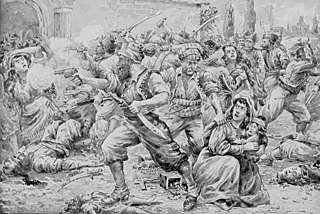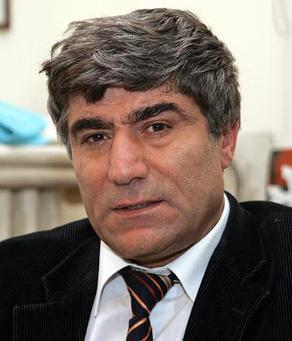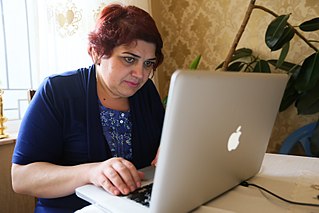
The Republic of Azerbaijan is a member of the United Nations, the Non-Aligned Movement, the Organization for Security and Cooperation in Europe, NATO's Partnership for Peace, the Euro-Atlantic Partnership Council, the World Health Organization, the European Bank for Reconstruction and Development; the Council of Europe, CFE Treaty, the Community of Democracies; the International Monetary Fund; and the World Bank.

The Nagorno-Karabakh conflict is an ethnic and territorial conflict between Armenia and Azerbaijan over the region of Nagorno-Karabakh, inhabited mostly by ethnic Armenians until 2023, and seven surrounding districts, inhabited mostly by Azerbaijanis until their expulsion during the 1990s. The Nagorno-Karabakh region was entirely claimed by and partially controlled by the breakaway Republic of Artsakh, but was recognized internationally as part of Azerbaijan. Azerbaijan gradually re-established control over Nagorno-Karabakh region and the seven surrounding districts.
Perihan Mağden is a Turkish writer. She was a columnist for the newspaper Taraf. She was tried and acquitted for calling for opening the possibility of conscientious objection to mandatory military service in Turkey.

Anti-Armenian sentiment, also known as anti-Armenianism and Armenophobia, is a diverse spectrum of negative feelings, dislikes, fears, aversion, racism, derision and/or prejudice towards Armenians, Armenia, and Armenian culture.

Hrant Dink was a Turkish-Armenian intellectual, editor-in-chief of Agos, journalist, and columnist. As editor-in-chief of the bilingual Turkish-Armenian newspaper Agos, Dink was a prominent member of the Armenian minority in Turkey best known for advocating Turkish–Armenian reconciliation and human and minority rights in Turkey. He was often critical of both Turkey's denial of the Armenian genocide and of the Armenian diaspora's campaign for its international recognition. Dink was prosecuted three times for denigrating Turkishness, while receiving numerous death threats from Turkish nationalists.

Thomas Patrick Lowndes de Waal is a British journalist and writer on the Caucasus. He is a senior fellow at Carnegie Europe. He is best known for his 2003 book Black Garden: Armenia and Azerbaijan Through Peace and War.
Etyen Mahçupyan is a Turkish Armenian journalist, writer, columnist and politician of Armenian descent who served as the senior adviser to Prime Minister of Turkey Ahmet Davutoğlu from 2014 to 2015. He is one of the executive members of the founders' committee of the Future Party (Turkey).
The Deutscher Journalisten-Verband (DJV) or German Journalists Association is among the largest journalists' organizations in Europe. The DJV has its headquarters in Berlin and has about 38,000 members. The chairman since 2003 has been the journalist Michael Konken, while the deputy national chairman since 2007 is Ulrike Kaiser. The federal executive of the organization is Kajo Dohring, while from 1989 to 1998 Hermann Meyn was chairman of the association.
A rally commemorating the twentieth anniversary of the 1992 massacre of Azerbaijani civilians and armed troops by local irregular Armenian forces and the 366th Commonwealth of Independent States Guards Motor Rifle Regiment took place in Istanbul on 26 February 2012. It was the largest campaign within "Justice for Khojaly" framework. The demonstration with slogan "We are all from Khojaly" started in front of Galatasaray High School and lasted several hours in Taksim Square with around 200,000 participants.

Khadija Rovshan qizi Ismayilova, alternatively spelled Ismailova, is an Azerbaijani investigative journalist and radio host who is currently working for the Azerbaijani service of Radio Free Europe/Radio Liberty, until recently as the host of the daily debate show İşdən Sonra. She is a member of the Organized Crime and Corruption Reporting Project.
Most Azerbaijanis receive their information from mainstream television, which is unswervingly pro-government and under strict government control. According to a 2012 report of the NGO "Institute for Reporters' Freedom and Safety (IRFS)" Azerbaijani citizens are unable to access objective and reliable news on human rights issues relevant to Azerbaijan and the population is under-informed about matters of public interest.

Amberin Zaman is a Turkish journalist and a chief correspondent for Al-Monitor based in London covers major stories on the MENA. Having started as a journalist in the early 1990s in Turkey, Zaman contributes to various newspapers throughout the world. Her reporting focuses on geopolitical trends, conflicts, diplomacy and human rights. She studied political science at Franklin College in Lugano Switzerland, speaks fluent English, French, Turkish and Bengali.

Censorship in Serbia is prohibited by the Constitution. Freedom of expression and of information are protected by international and national law, even if the guarantees enshrined in the laws are not coherently implemented. Instances of censorship and self-censorship are still reported in the country.
The European Centre for Press and Media Freedom (ECPMF) is a non-profit organisation that promotes, protects and defends the right to a free media and freedom of expression throughout Europe. It was founded in 2015 as a watchdog of the European Charter on Freedom of the Press. The vision of the European Centre for Press and Media Freedom is a society where media freedom enables open discourse and everyone can seek, receive and impart information. The main activities of the ECPMF are monitoring press and media freedom violations, advocacy and practical help for journalists, such as legal support and a "journalists-in-residence" programme, and engaging diverse stakeholders across Europe.

Osservatorio Balcani e Caucaso Transeuropa is a think tank and online newspaper based in Trento, Italy, and specialised on South East Europe.
eQualitie is a Canadian digital security organisation focused on the development and distribution of free, open-source software, services and security training to civil society, NGO's, investigative journalists and independent media to protect and promote human rights and press freedom online. The group is based in Montreal, Canada.
The human rights record of Bosnia and Herzegovina has been criticised over a number of years by intergovernmental organisations including the United Nations Human Rights Council, the European Court of Human Rights and the Organisation for Security and Co-operation in Europe, as well as international and domestic non-governmental organisations such as Human Rights Watch and Amnesty International. The government of Bosnia and Herzegovina has been criticised for ethnic and religious discrimination in its treatment of ethnic and religious minorities such as the Romani people and the Jewish people. The government has also been criticised for its treatment of Internally Displaced Persons following the Bosnian War and its failure to provide asylum seekers with resources such as food, shelter and medical assistance. According to BH Novinari, the Bosnian Journalists’ Association, freedom of the media is an issue in Bosnia and Herzegovina, with journalists facing attacks, threats and pressure from government. Human rights non-government organisations have also reported interference in their work from the government. The Bosnian government has been criticised by the European Union for its slow response to domestically prosecute war crimes from the Bosnian War following the closure of the International Criminal Tribunal for the Former Yugoslavia in December 2017.
Meline Toumani is an American author and journalist. Her memoir There Was and There Was Not: A Journey Through Hate and Possibility in Turkey, Armenia, and Beyond was a finalist for the 2014 National Book Critics Circle Award for Autobiography and 2015 Dayton Literary Peace Prize. In 2019, she joined the faculty at Bard College to teach in their Globalization and International Affairs program.
Georgi Vanyan was an Armenian peace activist and chairman of the Caucasus Center of Peace-Making Initiatives.









